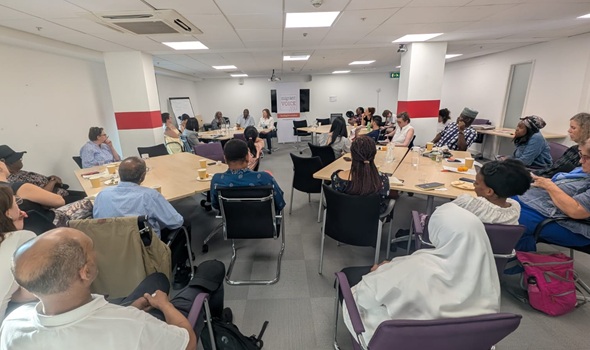Discussing implications and responses to immigration white paper
Discussing implications and responses to immigration white paper

On Wednesday 25 June 40 people joined Migrant Voice to discuss the implications of the recently announced Immigration White Paper and identify ways in which to campaign for a fairer immigration system in the face of such hostility.
Sonia Lenegan, Editor at Free Movement and an experienced immigration, asylum and public law solicitor, Mariam Bafo, Policy and Public Affairs Lead at WeBelong, and Wilf Sullivan, Trade Unionist and Migrant Voice Trustee, provided necessary background to the white paper and where we stand in terms of anti-immigration policies. We were also joined by Juliana Lobo and Robert Omolo who spoke passionately about their own experiences of the current visa system, and what the proposed changes would mean to their lives, and those of their families.
As Juliana explained: “Since 2018 when I first came with a student visa to the UK to do my master's degree, my family and I have made the UK our home. We have obeyed the law; we learned the language. We've paid our taxes and we contributed to our communities. We have built relationships, friendships and lives here, we have given back to the British society with our work, our energy, energy and our respect, and yet we are being treated as if we don't belong, as if we are invisible.”
Sonia started the meeting by setting out the, many, key elements of the White Paper, and what they could mean for those who are affected while stressing that at this stage these are proposals and not official policies: “So nothing in here is confirmed as yet, but some of the language is clear about where a change has already been decided on, as opposed to stating that there is an intention to consult. So that is something that's important to bear in mind when reading the paper, as we were just discussing. It is a vague and badly edited document which has left everyone in a position of uncertainty.”
Having already succeeded in getting the ten-year-route previously reduced for young people, Mariam was able to highlight the issues which the increase from five years to ten years could cause. These were not just focused on the extortionate costs, and stress, which they place on migrants, but also how it entrenches anti-migrant attitudes as policy: “The political landscape is very dangerous…We've seen the language that our politicians are using, and it's a lack of accountability when you know the narrative is very harmful”.
Wilf drew on his personal and professional experience to look at how the very basis for anti-immigration proposals and policies, such as the White Paper, are based on falsehoods and myths. They have been founded on the idea the UK was built without migration, that it was isolated from everywhere else, that people coming to the country is somehow an “attack” on a way of life which never existed. It is through building on these ideas that politicians, across the spectrum, and for decades, have attacked migrants, Wilf said, and added that “We are not, you are not strangers in a foreign land. You are people that are part of communities, that are building, those communities, are trying to get on with your life and should be treated in the same way that everybody else in this country is.”
After hearing the personal experiences of Juliana and Robert, highlighting the huge cost, mental as well as financial, the meeting opened up to questions and discussion about what we could do to combat these proposals, and others.
It was recognised that the work of Migrant Voice, and other organisations, was essential in changing the way in which migrants are spoken about, and the policies which are forced upon them, through helping individuals speak out and share their own experiences with policymakers. Currently it is seen that the “debate” around immigration does not reflect actual public opinion. Instead, it reflects a vocal group who ignore the lives of migrants. Through advocating with MPs and the media to share their experiences, their problems, their concerns, then it was argued we can shape a new narrative which sees us treated with respect and dignity.


